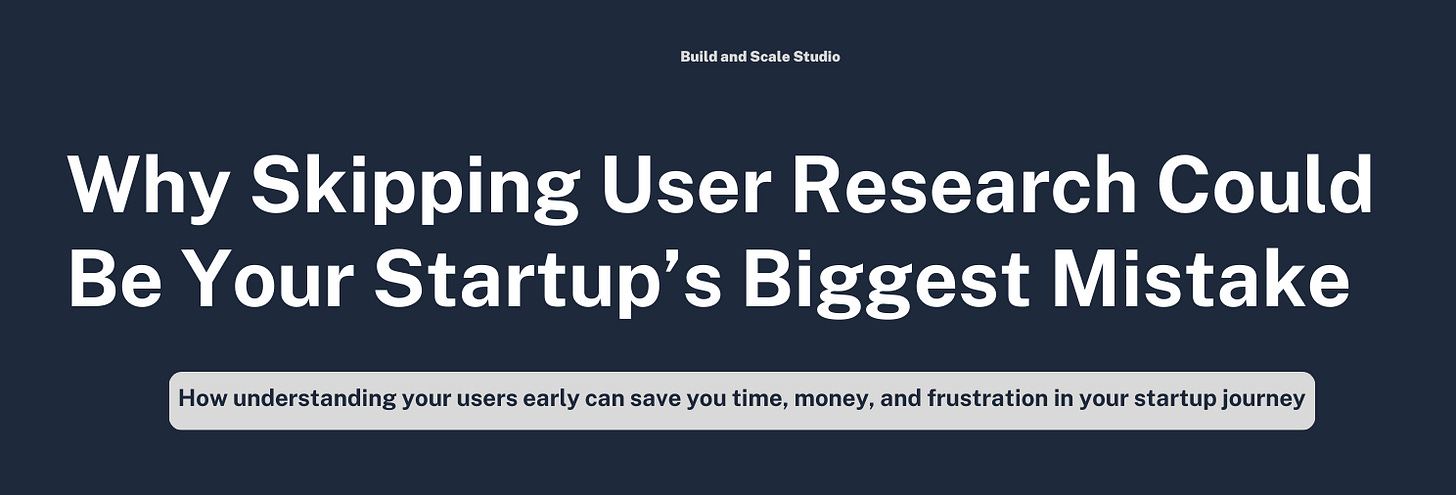Why Skipping User Research Could Be Your Startup’s Biggest Mistake
How understanding your users early can save you time, money, and frustration in your startup journey
Many founders fall in love with their idea and that’s where the problems start.
You sketch it out, imagine the UI, maybe even spin up a landing page and post on Product Hunt. But then… silence. No traction, no real engagement, and a creeping sense that something’s off.
Most times, what’s missing isn’t marketing. It’s user understanding.
Skipping user research is like setting out on a road trip without a map, except you’re also blindfolded and guessing where your car is.
User research helps you remove the blindfold.
What is User Research, Really?
User research isn’t just “talking to people.” It’s systematically learning how people think, feel, and behave so you can build something that solves a real problem they care about.
It includes:
Interviews and open conversations
Observing user behavior
Surveys (used wisely)
Testing your assumptions
Listening to language people use when they describe their problems
At its core, user research is about empathy + evidence. You’re not just validating your solution you’re discovering the problem in full color.
Why It Matters (Especially Early On)
Here’s why user research is non-negotiable in the earliest stages:
You don’t know what you don’t know
You’re probably making assumptions. About the problem. The market. The user. The solution. Research helps uncover blind spots early.
It saves you time and money
Every feature built on a false assumption is wasted effort. Research keeps you lean and focused on what matters.
It defines your MVP
Your MVP isn’t what you can build, it’s what users need most right now. Research tells you where to start.
You build trust with early adopters
Talking to users before building shows you're serious about solving their problem. You get real-world feedback and buy-in.
It gives you language you can use in marketing
The way people talk about their problems becomes copy gold, emails, landing pages, social posts, pitch decks.
Common Mistakes Founders Make Without User Research
These are all too familiar:
Building for themselves
Saying “I’d use this” ≠ a market exists. You are not your customer.
Starting with features instead of problems
It’s easy to fall in love with what you're building. But without anchoring it to real pain points, you're just shipping guesses.
Confusing feedback with validation
Just because someone says “that’s cool” doesn’t mean they’d use or pay for it. You need commitment, not compliments.
Waiting too long to do research
Don’t wait till the product is built. Research before, during, and after. It's not a phase. It’s a continuous loop.
How to Get Started with User Research (Even If You’re Solo or Broke)
Here’s the good news: you don’t need a research team or big budget. You just need curiosity and structure.
Define your ideal early user
Not just “startup founders.” Are they technical? Non-technical? What industry? What problem are they living with?
Start with problem interviews
Don’t pitch. Ask:
What’s the biggest challenge you face in [X]?
When was the last time this happened?
What have you tried to solve it?
What’s frustrating about the current solution?
Find users in the wild
Use Twitter/X, LinkedIn, Reddit, Slack groups, communities like Indie Hackers or online forums.
Document everything
Use Notion, Google Docs, or a voice recorder. Capture what people say, not what you interpret.
Synthesize patterns
Look for recurring themes:
What’s the real pain?
How urgent is it?
What words do they use?
When and How to Revisit Research as You Grow
User research isn’t just an early-stage activity. You need to revisit it at every major milestone:
Launching a new feature? Talk to users.
Seeing drop-off in onboarding? Observe and interview.
Not sure why churn is high? Dig in with exit interviews.
Great founders treat research like oxygen: continuous, vital, and foundational.
I once worked with a solo founder who built a productivity tool for remote teams. Months of development, clean design, solid functionality. But barely any signups.
So we paused and did 10 problem interviews with remote team leads.
Turns out, their main frustration wasn’t tracking productivity, it was getting team buy-in to use any new tool at all. They hated juggling logins, dealing with team resistance, and spending time explaining how new apps worked.
That insight led to a major pivot: instead of “a new productivity tool,” we repositioned as a plug-and-play Slack bot, no new platform, no onboarding headache.
That change led to 300+ signups in a week.
The biggest unlock in early-stage building isn’t funding, design, or even engineering.
It’s clarity.
And clarity comes from talking to real people, hearing real problems, and building in response, not in a vacuum.
User research isn’t extra work. It is the work.
So before you sketch that next wireframe or polish that prototype, pause. Get out of your own head. Get into your users’ world.
They’re the ones holding the answers.




